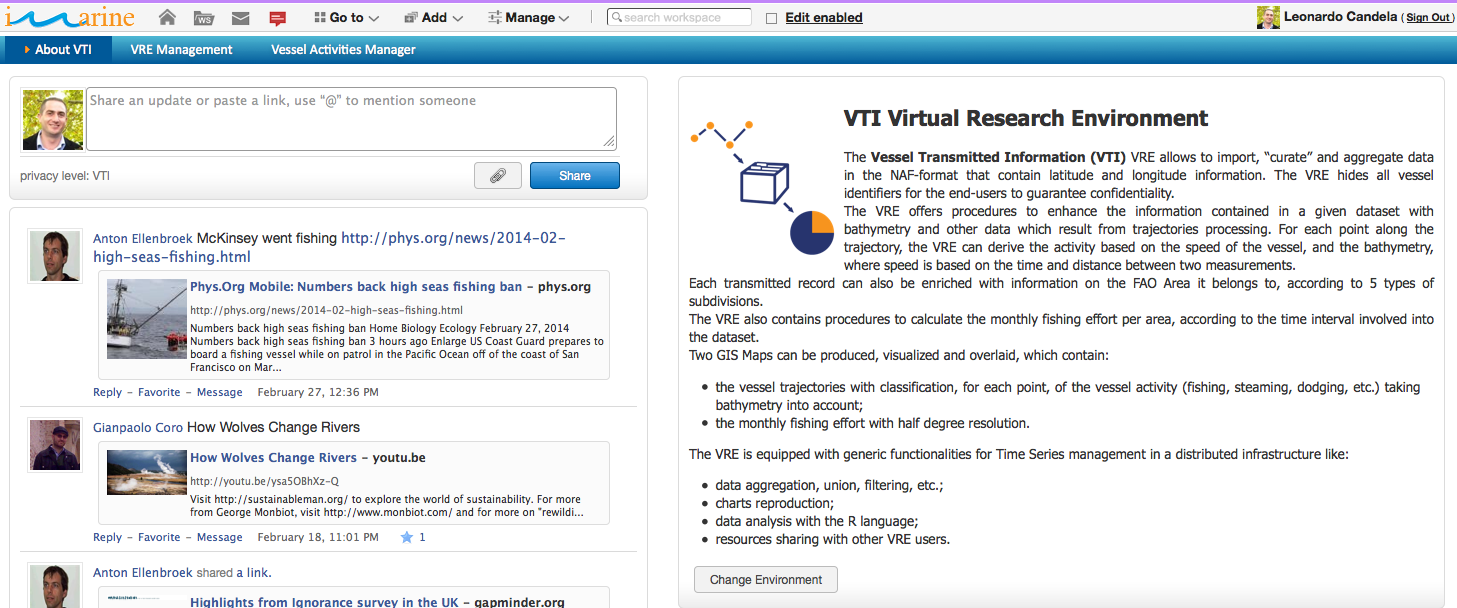The VTI Virtual Research Environment
Contents |
Description
The Vessel Transmitted Information (VTI) Virtual Research EnvironmentA ''system'' with the following distinguishing features: ''(i)'' it is a Web-based working environment; ''(ii)'' it is tailored to serve the needs of a Community of Practice; ''(iii)'' it is expected to provide a community of practice with the whole array of commodities needed to accomplish the community’s goal(s); ''(iv)'' it is open and flexible with respect to the overall service offering and lifetime; and ''(v)'' it promotes fine-grained controlled sharing of both intermediate and final research results by guaranteeing ownership, provenance, and attribution. is for marine biologists willing to analyse vessel activities over space and time by taking into account environmental data.
URI: https://portal.i-marine.d4science.org/group/vti
Functionality
The main facilities this VREVirtual Research Environment. offers are:
- Vessel Activities Management: to enable users to perform data mining tasks on Vessel trajectories. In enable data managers to import and transform CSV files representing trajectories into well-defined tabular data, to enrich such tabular data with information on FAO areas and bathymetry, to perform mining tasks aiming at deriving the vessel activity by relying on vessel speed and bathymetry. Besides these specific operations, the environment supports the analysis of the data by enabling a user to (i) perform operations like grouping and filtering, (ii) producing charts and GIS maps (if the data have geographic features) and (iii) analysing the data via an R environment;
- Reporting facilities: to enable users to collaboratively produce reports consisting in complex documents characterised by well defined structures (templates). Via this facility, users can define new templates as well as collaboratively create new reports compliant with defined templates. Reports might contain diverse elements ranging from texts to images and tables, and such constituents can result from objects stored in the user workspace. Reports can be materialised in multiple formats including PDF, HTML and OpenXML;
- Documents Workflow facilities: to enable users (i) to define complex workflows (including steps and roles users should have to perform certain steps) governing the production of gCube documents, (ii) to instantiate such workflows to actual documents to be collaboratively created, and (iii) to monitor workflow execution;
- Workspace: to enable every user to store and organise the information objects he/she is interested to work with. In addition to that, the user is allowed to collaborate with other users by sharing objects and messages;
- VREVirtual Research Environment. Management: to enable authorised users (i.e. VREVirtual Research Environment. Managers) to manage other users using or willing to access the VREVirtual Research Environment.. VREVirtual Research Environment. Managers are enabled to (i) authorise users in accessing the VREVirtual Research Environment., (ii) assign or withdraw roles to users, (iii) remove users, and (iv) send a communication to the current users.
Data
No data source is needed.
Software
- (DONE) gCube 2.7.2 (December '11);
- (DONE) gCube 2.7.3 (February '12);
- (DONE) gCube 2.8.0 (March '12);
- (DONE) gCube 2.8.1 (April '12);
- (DONE) gCube 2.9.0 (June '12);
- (DONE) gCube 2.9.1 (August '12);
- (DONE) gCube 2.11.0 (October '12);
- (DONE) gCube 2.12.0 (February '13);
- (DONE) gCube 2.13.0 (March '13);
- (DONE) gCube 2.14.0 (May '13);
- (DONE) gCube 2.15.0 (June '13);
- (DONE) gCube 2.16.0 (July '13);
- (DONE) gCube 2.17.0 (December '13);
- (DONE) gCube 2.17.1 (December '13);
- (DONE) gCube 3.0.0 (March '14);
